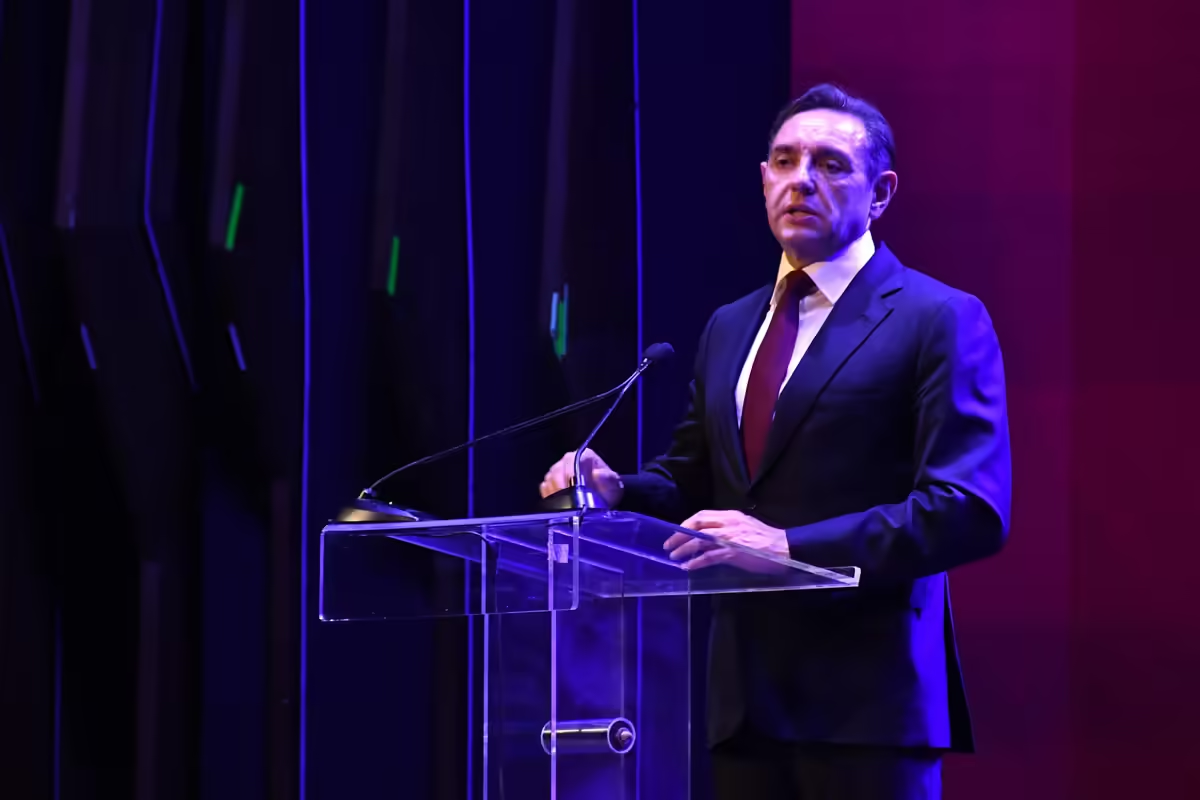Entertainment
Vulin Promotes ‘Serbian World’ at Russian Historical Society Launch

On October 26, 2023, Aleksandar Vulin, president of the Belgrade branch of the Russian Historical Society, openly declared the organization’s commitment to advocating for a “Serbian world.” During its founding assembly in Belgrade, he emphasized the intention to establish Serbia as a staunch ally of Russia and China. Vulin’s comments have raised concerns in the Western Balkans, where critics link the term “Serbian world” to nationalist ambitions reminiscent of the early 1990s, a period marked by the violent disintegration of the former Yugoslavia.
Vulin, known for his pro-Russian views and previous role as head of Serbia’s intelligence agency, articulated that rejecting ties to Russia equates to rejecting Serbia itself. He stated, “Every generation of the Serbian people has awaited their physical survival to depend on Russia.” He further outlined that the primary mission of the Russian Historical Society in Serbia will be to combat historical revisionism and preserve the “historical truth” regarding both the Serbian and Russian nations.
In January 2024, Vulin received an award from Russian President Vladimir Putin and the Federal Security Service, solidifying his close ties to the Kremlin. The U.S. State Department sanctioned him in mid-2023 due to his connections with Russia and allegations of corruption during his tenure at the Security Information Agency.
The Russian Historical Society is led by Sergei Naryshkin, director of the Russian Foreign Intelligence Service. Since Russia’s full-scale invasion of Ukraine in February 2022, Vulin and Naryshkin have met several times to discuss their countries’ intertwined destinies. Despite the European Union’s sanctions on Kremlin officials, Serbia has not joined these measures, maintaining its relationship with Moscow, often attributed to Vulin’s influence.
During the assembly, Naryshkin addressed attendees via video, asserting the historical ties between Russia and Serbia, as well as the “principled similarities of our traditional values.” The event also featured notable figures, including Serbian Interior Minister Ivica Dacic, Patriarch Porfirije of the Serbian Orthodox Church, and Goran Selak, president of the Socialist Party of Serbia.
Patriarch Porfirije highlighted the significance of the Russian Historical Society in “times of fierce historical revisionism,” proclaiming, “The solemn opening of this institution in Serbia confirms the ongoing spiritual connection between our two peoples.” He expressed confidence that, with divine assistance, this bond would endure in the future.
Russian Ambassador to Serbia, Alexander Bocan-Harchenko, described the establishment of the Russian Historical Society as “an important political and scientific message.” He emphasized that one of the critical objectives for both Russia and Serbia is to strengthen the sovereignty and independence of their nations, underscoring that “without knowledge of one’s history, there is neither sovereignty nor future.”
The assembly commenced with the national anthems of Russia, the Republic of Srpska, and Serbia, followed by a minute of silence to honor the recently deceased former Yugoslav Army general, Nebojsa Pavkovic, who had been convicted by the International Criminal Tribunal for the former Yugoslavia.
The Russian Historical Society, founded by various entities, including the Russian Academy of Sciences and state media outlets like RIA Novosti and Interfax, aims to reshape historical narratives. Recent activities have included the restoration of museums in territories referred to as “Novorossiya,” a term the Kremlin uses for parts of Ukraine occupied during the military invasion.
Investigations have also revealed concerning exhibitions, such as a display of a NATO bomb with a message reading “Happy Easter,” which was misrepresented as part of the Alliance’s arsenal during the 1999 bombing of the Federal Republic of Yugoslavia. However, investigations indicated the bomb was photographed at a U.S. base in South Vietnam between 1967 and 1970, long before NATO’s intervention.
As Serbia continues to navigate its complex geopolitical landscape, the implications of Vulin’s remarks and the activities of the Russian Historical Society will likely resonate within both regional and international contexts.
-

 Health3 months ago
Health3 months agoNeurologist Warns Excessive Use of Supplements Can Harm Brain
-

 Health3 months ago
Health3 months agoFiona Phillips’ Husband Shares Heartfelt Update on Her Alzheimer’s Journey
-

 Science1 month ago
Science1 month agoBrian Cox Addresses Claims of Alien Probe in 3I/ATLAS Discovery
-

 Science1 month ago
Science1 month agoNASA Investigates Unusual Comet 3I/ATLAS; New Findings Emerge
-

 Science4 weeks ago
Science4 weeks agoScientists Examine 3I/ATLAS: Alien Artifact or Cosmic Oddity?
-

 Entertainment4 months ago
Entertainment4 months agoKerry Katona Discusses Future Baby Plans and Brian McFadden’s Wedding
-

 Science4 weeks ago
Science4 weeks agoNASA Investigates Speedy Object 3I/ATLAS, Sparking Speculation
-

 Entertainment4 months ago
Entertainment4 months agoEmmerdale Faces Tension as Dylan and April’s Lives Hang in the Balance
-

 World3 months ago
World3 months agoCole Palmer’s Cryptic Message to Kobbie Mainoo Following Loan Talks
-

 Science4 weeks ago
Science4 weeks agoNASA Scientists Explore Origins of 3I/ATLAS, a Fast-Moving Visitor
-

 Entertainment4 months ago
Entertainment4 months agoLove Island Star Toni Laite’s Mother Expresses Disappointment Over Coupling Decision
-

 Entertainment3 months ago
Entertainment3 months agoMajor Cast Changes at Coronation Street: Exits and Returns in 2025









